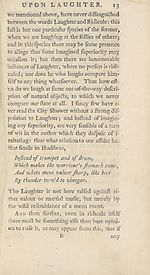Download files
Complete book:
Individual page:
Thumbnail gallery: Grid view | List view

i4 REFLECTIONS
any one would relate in the fimpleft manner
thefe very weaknefles of others, their extra¬
vagant paffions, their abfurd opinions, upon
which the man of wit would rally, (hould we
hear the beft vouchers of all the fatts alleged,
we fhall not be difpofed to Laughter by bare
narration; or fhould one do a real important
injury to another, by taking advantage of his
weaknefs, or by fome pernicious fraud let us
fee another’s fimplicity, this is no matter of
Laughter: and yet theft important cheats do
really diftover our ftperiority over the perlbn
cheated, more than the trifling impoflures of
our humourifts. The opinion of our ftiperi-
ority may raift a ftdate joy in our minds, ve¬
ry different from Laughter; but filch a thought
ftldom arifts in our minds in the hurry of a
chearful converfation among friends, where
there is often an high mutual efieem. But we
go to our cloftts often to fpin out fbme fine
conjeftures about the principles of our actions,
which no mortal is confcious of in himfelf dur¬
ing the aftion; thus the fame authors above-
mentioned tell us, that the defire which we
have to fte tragical repreftntations is, becauft
of the fee ret pleafure we find in thinking our-
ftlves ftcure from fuch evils; we know from
what ftft this notion was derived.
Quibus ipfe mails liber es, quia cernere fuave.
Lucr.
This
any one would relate in the fimpleft manner
thefe very weaknefles of others, their extra¬
vagant paffions, their abfurd opinions, upon
which the man of wit would rally, (hould we
hear the beft vouchers of all the fatts alleged,
we fhall not be difpofed to Laughter by bare
narration; or fhould one do a real important
injury to another, by taking advantage of his
weaknefs, or by fome pernicious fraud let us
fee another’s fimplicity, this is no matter of
Laughter: and yet theft important cheats do
really diftover our ftperiority over the perlbn
cheated, more than the trifling impoflures of
our humourifts. The opinion of our ftiperi-
ority may raift a ftdate joy in our minds, ve¬
ry different from Laughter; but filch a thought
ftldom arifts in our minds in the hurry of a
chearful converfation among friends, where
there is often an high mutual efieem. But we
go to our cloftts often to fpin out fbme fine
conjeftures about the principles of our actions,
which no mortal is confcious of in himfelf dur¬
ing the aftion; thus the fame authors above-
mentioned tell us, that the defire which we
have to fte tragical repreftntations is, becauft
of the fee ret pleafure we find in thinking our-
ftlves ftcure from fuch evils; we know from
what ftft this notion was derived.
Quibus ipfe mails liber es, quia cernere fuave.
Lucr.
This
Set display mode to:
![]() Universal Viewer |
Universal Viewer | ![]() Mirador |
Large image | Transcription
Mirador |
Large image | Transcription
| Antiquarian books of Scotland > Curiosities & wonders > Reflections upon laughter > (22) |
|---|
| Permanent URL | https://digital.nls.uk/119117756 |
|---|
| Description | Thousands of printed books from the Antiquarian Books of Scotland collection which dates from 1641 to the 1980s. The collection consists of 14,800 books which were published in Scotland or have a Scottish connection, e.g. through the author, printer or owner. Subjects covered include sport, education, diseases, adventure, occupations, Jacobites, politics and religion. Among the 29 languages represented are English, Gaelic, Italian, French, Russian and Swedish. |
|---|

